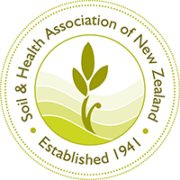About us
Organic NZ is Aotearoa’s leading organics and sustainable living magazine.
We serve the New Zealand community with independent news, features and information on how to farm, grow and eat organically; maintain health and wellness; and how to avoid waste, artificial chemicals and genetically engineered produce. We explore the drivers of nature degradation and the social inequities in food and health outcomes. We offer perspectives, solutions and actions to address these environmental and social challenges.
We act as a guardian and watchdog over the integrity of organic products, food and farming.
Organic NZ is proudly New Zealand owned and operated. The magazine is published independently by the Soil & Health Association of New Zealand and is delivered free to all association members. The magazine explores and communicates our maxim, “healthy soil, healthy food, healthy people” / “oranga nuku, oranga kai, oranga tāngata”.
We recognise Māori as tangata whenua and Te Tiriti ō Waitangi as the founding document of our nation. This means we support readers with the use of te reo Māori and actively involve Māori in decisions relating to magazine direction and approach.
We are committed to diversity and inclusion. We demonstrate this by working alongside marginalised people and communities in order to tell their stories.
Magazine content
We publish a wide range of stories and information relevant to the communities we serve, including members of the Soil & Health Association. Topics we cover include, but are not limited to: home and community organic gardening; food and nutrition; organic farming and horticulture; organic clothing and care products; waste minimisation; genetic engineering and chemical issues; and natural health and wellness.
We encourage and support the use and purchase of certified organic products and will always include relevant information about certification in the work we publish. We will not carry claims of organic status that cannot be verified.
We also recognise the relevance of non-certified products, practices or inputs which may form part of community-level production, allied or adjacent production systems, food cultures or dietary choices. Our coverage of these wider issues will take care to establish and explore any connections with organic practice while avoiding the implication that they are organically certified.
We welcome story pitches and contributions. For more information see our website or contact the editor directly: editor@organicnz.org.nz
The magazine editor and publisher retain the right to decide on all matters relating to content, including story inclusion, editing decisions, imagery and opinion.
Any promotional content included in the magazine will be clearly marked.
Advertising
Organic NZ is pleased to carry a range of advertising to better inform readers and allow products and services to find customers. We do not necessarily endorse the services, products or claims of advertisers.
We reserve the right to decline adverts or advertisers.
Advertisements carrying claims that a product is organic will be verified by us, to ensure appropriate certification status.
If you are concerned about advertising you’ve seen in Organic NZ, then please contact the editor in the first instance. If you want to know more about advertising regulations in New Zealand, please consult the Advertising Standards Authority for more information: ASA – Advertising Standards Authority
Editorial responsibility
We take our publishing role seriously and aim to provide factual and balanced reporting to serve our audiences and the wider New Zealand public.
To uphold this responsibility, we will fact-check information included in Organic NZ and identify information sources where this is relevant. We will privilege independent or publicly-funded research and analysis over industry-funded data and information. Opinion will be clearly marked.
When dealing with controversial issues or areas of scientific uncertainty, we will strive to provide balance by offering alternative views or criticisms.

